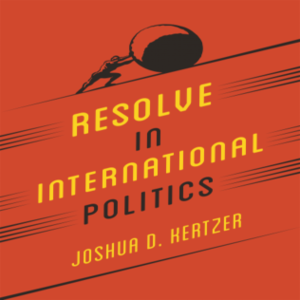Resolve in International Politics


“Resolve in International Politics”
Speaker: Kertzer, J. (Harvard University)
Date: 29 May 2019
Speaker Session Preview
SMA hosted a speaker session presented by Dr. Joshua Kertzer (Harvard University) as a part of its SMA STRATCOM Academic Alliance Series. In this talk, Dr. Kertzer focused on the psychology of resolve in international politics. Resolve is the ability to stand firm while others back down. At the end of the day, resolve isn’t directly observable, nor is it easy to figure out another side’s breaking point. He stressed that precisely because resolve is unobservable is why it is so important. Assessing resolve as an “ill-structured problem” requires choosing different indicators to draw inferences about resolve. Dr. Kertzer breaks down resolve into a basic equation of two parts: Resolved = situational features + dispositional characterizes. Situational features are the equivalent to the cost of war (costs of fighting but also the costs of backing down, including reputation costs). So how do actors answer these costs? They do through dispositional characteristics. These include time preferences (preference of future to the present); risk preferences, honor orientations, and trait self-control. In testing the interactionist theory of resolved, Dr. Kertzer worked to explain variation in resolve in public opinion towards military interventions and assess how resolve affects state behavior. The results from the experiment show that lay people think alike—that elites assess resolve similarly to the public. Further study will look at cross-cultural variations in assessments of resolve, difference between elite and mass cognition, and aggregation in foreign policy decision-making.
Joshua Kertzer Bio
Joshua D. Kertzer is the Paul Sack Associate Professor of Political Economy at Harvard University. His research specializes in the intersection of international security, political psychology, foreign policy, and public opinion. He is the author of Resolve in International Politics (Princeton University Press, 2016), along with articles appearing in a variety of academic journals, including the American Journal of Political Science, Annual Review of Political Science, British Journal of Political Science, Conflict Management and Peace Science, International Organization, International Studies Quarterly, Journal of Conflict Resolution, Journal of Politics, and World Politics. He has received the American Political Science Association's Helen Dwight Reid and Kenneth N. Waltz awards, the International Society of Political Psychology's Alexander George Award, and the Peace Science Society's Walter Isard award, as well as fellowships at the Dickey Center for International Understanding at Dartmouth College and the Niehaus Center for Globalization and Governance at Princeton University. At Harvard, he teaches classes on American foreign policy, international relations theory, and political psychology in international politics. He received his PhD in Political Science from The Ohio State University.
